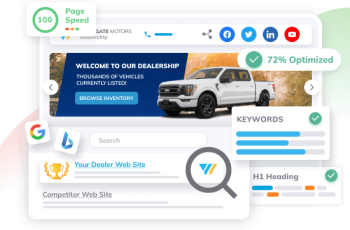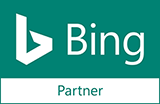What Should You Know About Google Algorithms?

It’s not a secret that Google regularly rolls out algorithms to provide the most accurate, relevant and reliable results to users’ queries. Not all of the Google updates have a significant impact on the SERP but some of them have caused big changes in the ranking order of dealer websites. To understand what algorithms can influence the ranking and traffic of your site you should know some features and threats that each of Google changes has. You should also be aware of Google requirements to avoid strict penalties and sanctions.
Here are the algorithms that allow Google to take control of web resources in overall digital environment:
Launched: 02/24/2011
Updates: every month
Goal: to decrease the websites with low-quality content
The Google Panda algorithm detects pages with non-unique content. It puts penalties on the websites with exceeding amount of keyword queries and spam. The Panda algorithm also down-ranks websites in the following cases:
- Plagiarism
- A duplicated content on different pages of one website
- Automatically generated content
- Content spammed with keyword queries
- Spam content generated by users (e.g. comments)
- Thin content on the page (compared to ads)
- Bad user experience
- Check up your content for its uniqueness
- Check up your website for a duplicated content
- Check up the proportion of the content to outbound links on the page.
With the Panda algorithm the websites in the risk zone have more chances to lose their positions in Google. On the other hand, the site owners that suffered from the algorithm penalties can restore their positions and traffic in a short time.
Launched: 04/24/2012
Updates: 2012, 2013, 2014, 2016, at present is functioning in real time
Goal: to lower the websites with spam link profiles or link weight manipulations
As links are a decisive factor in Google ranking the Penguin algorithm was created to detect and apply sanctions to websites with unnatural link mass. The Penguin detects rented links which earlier were the main component of successful website promotion. It increases the chances for a site to get a penalty. The Penguin gives sanctions to web resources with the following links:
- Purchased links
- Links from low-quality spam websites
- Links from the sites that were created specifically as donors for building the link mass
- Unnatural link anchors
- Links from irrelevant pages
- Monitor changes in the link profile
- Get rid of bad links.
Launched: 08/30/2014
Updates: –
Goal: to give users more relevant search results based on the understanding their intentions.
The Hummingbird algorithm introduced big changes in the search engine’s interpretation of users’ requests. Keywords were given less attention than before. Google has improved its understanding of synonyms and divided content by topics. Now it is possible to see the search results that don’t have a user’s query, but only its synonyms.
- Make your text content interesting and varying.
- Make your texts readable.
- Give answers to user’s questions in your content.
Launched: 07/24/2014
Update: December 2014
Goal: to improve local search.
The Pigeon algorithm influences the search where a user’s location is significant. A distance between a user and an object offered as a result is one of the ranking factors. The Pigeon allows local businesses to dominate the search results page and to receive more traffic.
- Register with Google My Business
- Mention your dealer website in the directories of your region
- Make onpage and offsite optimization.
Launched: 04/21/2015
Updates: –
Goal: to up-rank mobile-optimized pages in the search results on mobile devices.
The Mobile update allows mobile-friendly webpages to rank higher in mobile search results. It does not affect the desktop version search. The Mobile gives a user more convenient pages to view from any mobile device. There is no need to zoom-in or out to read a text, use horizontal scrolling or make efforts to click on elements. The algorithm works for specific pages only, not for a website as a whole. One page can be considered mobile-optimized and get an increase in positions. The other page of the same site can be lowered in the SERP.
- Take care of responsive web design
- Go Mobile-Friendly test
- Check up your load speed
- Improve your website usability.
Launched: 10/26/2015
Updates: –
Goal: to give users the best results based on relevance and machine learning.
RankBrain is a part of the Hummingbird algorithm, a system of machine learning. It allows Google to better interpret and understand the meaning of users’ requests and provide more relevant results depending on the context. The algorithm determines the topic of the page and the content relevancy to a user’s query. By the visitors’ behavior the system of machine learning finds out if the content is useful, takes self-learning and provides the most useful results.
Your website is in the risk zone if you have the following:
- Webpages that are not relevant to users’ queries
- Bad user experience
- Make your content interesting and helpful
- Give answers to user’s questions in the texts
- Provide interactive elements on your site.
Launched: 09/01/2016
Updates: –
Goal: to provide more relevant local search results based on user’s location.
The Possum algorithm made user’s location the most important ranking factor for showing results. The closer is your dealership to user’s location, the more likely it will be displayed in the SERP. The Possum filters out affiliated organizations that have the same phone numbers or addresses. It gives a better ranking to companies located outside the physical city boundaries. Earlier such companies were not shown in the local search results and on the maps when the city name was entered.
- Specify your address in Google My Business and on your website in all details
- Provide outstanding landmarks if there are any
- Add location-specific keywords.
Launched: 03/08/2017
Updates: –
Goal: to filter out low-quality pages that make profit from ads and links to other websites.
The Fred update puts penalties on the websites that violate Google rules for webmasters. The sites with low-quality content, multiple optimized keywords, a large amount of ads or outbound links get down-ranked by the Fred. It puts penalties on the resources that provide the following:
- Banner ads, pop-ups and other types of ads in excessive amount
- Articles written for search engine robots to generate traffic
- Lots of outbound links.
- Do not monetize your site with advertising
- Do not provide SEO-texts for robots
- Write relevant and useful content.
The knowledge about working principles of Google algorithms and updates will help you promote your online dealership globally and locally. If your website lost its traffic and positions but you can’t determine what algorithm has caused it and what to do next, contact us. Autoxloo will help your site meet Google requirements and get top positions of its search.


 Search ads
Search ads Mobile ads
Mobile ads